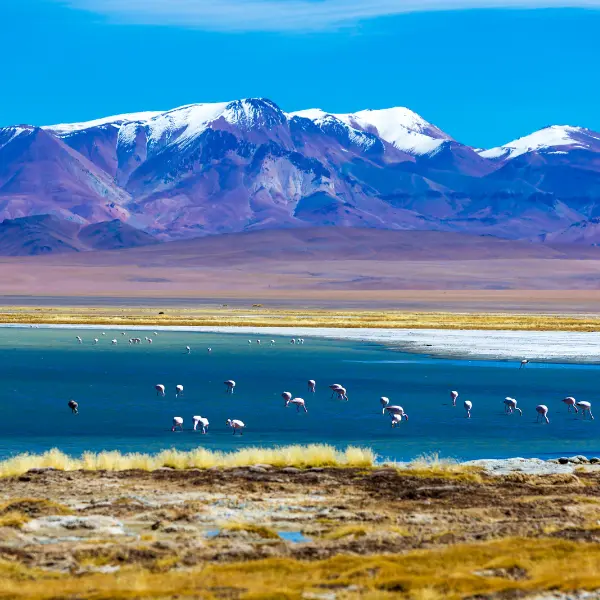


Uyuni .

Santiago , Uyuni , La Paz .

Uyuni , La Paz , Tiwanaku , Copacabana .

Cusco , Machu Picchu , Sacred Valley , Puno , Uyuni , La Paz .
The best time to visit Uyuni and its salt flats is during the rainy season from January to March, when a thin layer of water creates the famous giant mirror effect. However, the dry season from May to October offers the chance to explore the vast, dry salt flats and access remote areas like Incahuasi Island. Both seasons provide unique and breathtaking experiences.
The most popular tours in Uyuni include multi-day excursions across the Salar de Uyuni, which feature stops at Incahuasi Island, the Train Cemetery, and stunning high-altitude lagoons filled with flamingos. Longer tours extend into Eduardo Avaroa National Park, visiting the Red Lagoon, geysers, and hot springs. Sunset and stargazing tours are also unforgettable highlights.
In Uyuni, visitors can walk across endless salt flats, photograph the surreal reflections, and visit cactus-covered Incahuasi Island. Exploring the Train Cemetery offers a glimpse of the region’s history, while thermal baths and colorful lagoons provide natural beauty and relaxation. Stargazing at night is a magical experience, thanks to the high altitude and clear skies.
Uyuni has an extreme high-altitude climate, with daytime temperatures averaging 15°C and nighttime temperatures dropping well below freezing, especially from May to August. Rainfall occurs mainly between January and March, transforming the salt flats into a reflective mirror. Visitors should prepare for intense sun, cold nights, and rapid changes in weather.
Uyuni is served by Joya Andina Airport, which offers flights from La Paz and other Bolivian cities. Many travelers also reach Uyuni via overnight buses or train routes. Once in town, tours and transfers are easily arranged to explore the salt flats and surrounding attractions.
Uyuni offers a range of accommodations, from salt hotels built entirely of salt blocks to simple hostels and modern hotels. Staying in a salt hotel is a unique experience, combining comfort with the surreal atmosphere of the region. Lodging options are also available in small villages near the salt flats.
Dining in Uyuni is modest but includes traditional Bolivian dishes such as llama steak, quinoa soup, and salteñas. Small local restaurants and cafés provide hearty meals before or after tours. Some salt hotels also feature dining rooms serving regional specialties with a unique ambiance.
Cash in Bolivian bolivianos is essential in Uyuni, as many local businesses do not accept credit cards. Some tour operators and hotels may accept cards, but reliability is limited. ATMs are available in town, but it is best to prepare cash in advance, especially for tours and small purchases.
Uyuni hosts local celebrations such as Carnival, with colorful parades, dances, and Andean music. Traditional festivals linked to indigenous culture and agricultural cycles are also celebrated in the region. These events provide visitors with insight into Bolivian customs and traditions.
Uyuni, located in southwestern Bolivia, is home to the world’s largest salt flat, stretching over 10,000 square kilometers. It is a unique natural wonder known for its reflective surface during the rainy season and otherworldly landscapes during the dry months. The town of Uyuni serves as the main base for exploring this fascinating region.
Main highlights in Uyuni include the Salar de Uyuni, Incahuasi Island, the Train Cemetery, and the lagoons of Eduardo Avaroa National Park. Visitors can also explore volcanic landscapes, geysers, and Andean villages, making Uyuni a destination that combines natural beauty with cultural encounters.

We're flexible! Postpone your tour with zero cost up to 10 days prior to departure.